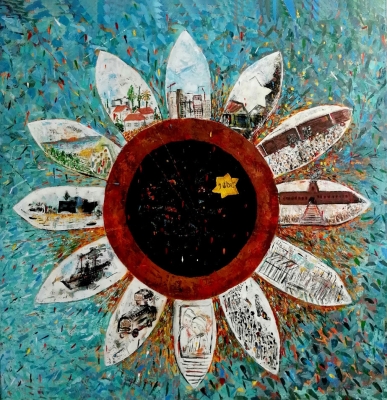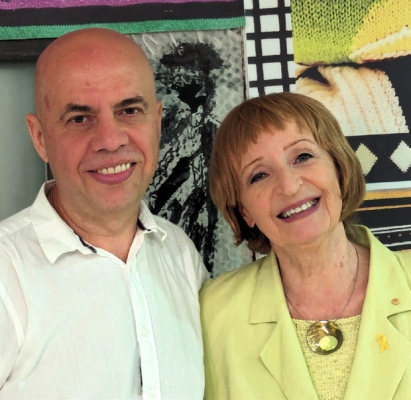Foliage of Life
The "Foliage of Life" exhibition by multidiscipline artist Dalia Ayalon Sinclair opened on May 20, 2024 in the presence of His excellency Radu Ioanid, Ambassador of Romania to Israel, at the Romanian Cultural Center in Tel Aviv, to mark the 80th anniversary commemoration of North Transylvania Jewish deportation. This event was co-hosted by the Sighet Culture Foundation.
Entering the exhibition, you could sense the impact of the Holocaust on Sinclair's life and her artistic endeavors. Whether installations, paintings or personal artefacts displayed in the glass-topped tables, and including banana peels depicting people on the run, death and survival – all displayed the family history.
Sinclair's parents were Holocaust survivors whose life stories impacted her artistic endeavors. Her mother was born in Sighet, at that time a very vibrant city in Romania with a large Jewish population. In April 1944, it all turned around as the Jews were rounded up into ghettos.
Between May 17-21, 1944, Piri Penina Motzen, together with her mother and younger sister Rivka were among 14,000 Jews pushed onto the trains to hell. Most were gassed on arrival at Auschwitz-Birkenau. So was Piri's mother, Esther Lea. Sinclair's mother and her sister were chosen fit to remove rocks along the train tracks and forests.
Her painting "Headlines" recounts her parents' journey. Each petal of the flower represents a signpost from the ghetto in Sighet onward to the train station, Auschwitz, death march to Bunah to Bergen Belzen, which was liberated by British and Canadian troops in May 1945. Unfortunately, her sister succumbed to death as freedom arrived. Bergen Belzen became a Displaced Persons (DP) camp and that is where Sinclair's mother met her father Meyer Jankelowitz, who had already lost a wife and son, and later married. Many of the DPs, most of whom were young and single, married and started families in the camp and thus found new hope for the future.
In March 1946, the Jewish Brigade arrived to transfer the Jewish survivors on trucks to Marseille. Together with 733 Jewish DPs, they boarded the Tel Chai ship to Eretz Israel. It was indeed a hazardous journey to freedom. Intercepted by the British Mandate on arrival in Haifa port on March 27, they were transported to Atlit detention camp for three weeks and then relocated to Yokneam. Sinclair's brother Avraham was born on October 23, 1946. While her father was recruited to the Jewish Brigade and later released to become an official guard at Yokneam, Piri Penina Jankelovitz was granted an official license to operate a Wireless Telegraphy transmission station between June 3, 1947 and May 31,1948.
"As a young mother and pregnant with me", said Sinclair "she too put her life on the line by alerting the Jewish neighbors on the approach of British soldiers to confiscate weapons.
"Decades passed until my mother told me her heroic account. These were the days of the War of Independence and my mother had to ensure that the people and weapons were safe. My mother was a true hero who risked her life - our lives". With a baby boy at home and pregnant with Dalia, she continued to receive information on search of weapons at Yokneam and surrounding posts. Her mother quickly wrapped the weapons together with baby Dalia into a blanket and as she opened the door, the British soldiers met a mother holding a screaming baby and little boy holding on to his mum's dress. They turned and left.
Sinclair travelled to Sighet on two occasions, during which she was able to find the gravestones of her great grandfather Shalom Motzen and her grandfather Avraham Chaim Motzen.
The Foliage of Life exhibition included Sinclair's other major multi-media art work "He didn't jump from the Window" which featured her late uncle David Malek. He had survived Auschwitz and other camps to become a success story helping and supporting other survivors.
Many events were held during the exhibition featuring prominent guest speakers, including poets, authors and artists. One of the events which left a very strong impact on Sinclair was the group visit by German adults who were second and third generation children of Nazi perpetrators. Discovering their families' well-kept horrific secrets, they sought to amend the past and make a difference by establishing the March of Life and travelling around the world to support Israel and stand against anti-Semitism. Said Sinclair, "It was the most emotional outburst on both sides - the ability to turn around, embrace the past and work together for the benefit of Israel and against anti-Semitism."
Her art is about remembering the past and healing the present - the foliage of life.









Comments